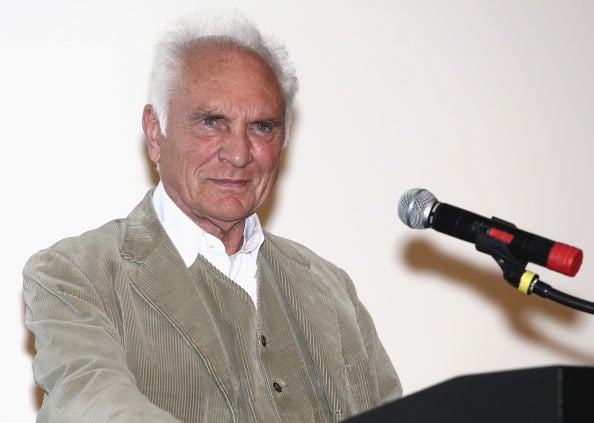What is Terence Stamp's net worth?
Terence Stamp is an English actor who has a net worth of $10 million. Terrence Stamp's career has spanned over six decades, encompassing iconic roles in film, television, and theater. Known for his striking presence, intense gaze, and resonant voice, Stamp first emerged as a breakout star of the 1960s British New Wave, earning critical acclaim for his early performances in films like "Billy Budd" and "The Collector." He later became a cult favorite thanks to his scene-stealing role as the villainous General Zod in the "Superman" franchise. Stamp has worked with some of cinema's most revered directors—including Pier Paolo Pasolini, Federico Fellini, and Steven Soderbergh—and his roles have ranged from aristocratic charmers to chilling antagonists to reflective elder statesmen. Whether in art-house dramas or Hollywood blockbusters, Stamp has maintained a magnetic, enigmatic screen presence that continues to captivate audiences worldwide.
Early Life and Breakthrough
Terence Henry Stamp was born on July 22, 1938, in Stepney, East London, the son of a tugboat captain. Raised in a working-class family, he developed a passion for film and acting from an early age, idolizing screen legends like Gary Cooper and James Dean. After a brief stint working in advertising, he trained at the Webber Douglas Academy of Dramatic Art in London.
Stamp's film debut came in 1962 when he landed the title role in "Billy Budd," directed by Peter Ustinov. His performance as the innocent, Christ-like sailor earned him an Academy Award nomination for Best Supporting Actor and instantly established him as a rising star.
The Swinging Sixties and Stardom
Throughout the 1960s, Stamp became a fixture of the "Swinging London" scene. He dated high-profile figures like model Jean Shrimpton and became as well known for his off-screen charisma as his acting. His role in "The Collector" (1965), opposite Samantha Eggar, earned him a BAFTA Award and cemented his reputation for playing psychologically complex characters.
He went on to appear in films such as "Modesty Blaise" (1966), "Far from the Madding Crowd" (1967), and "Teorema" (1968), directed by Italian auteur Pier Paolo Pasolini. His work with European filmmakers during this period reflected a deepening interest in more experimental and philosophical cinema.
Career Challenges and Reinvention
By the 1970s, Stamp's career had slowed, in part due to his own retreat from the film industry. He spent time living in India, exploring spirituality and alternative lifestyles. While he worked less during this period, he occasionally took roles in international productions, such as "The Mind of Mr. Soames" and "Blue."
His major comeback began in the 1980s. In 1987, Stamp delivered a sharp, charismatic performance in Oliver Stone's Wall Street as Sir Larry Wildman, a British corporate raider who becomes a rival to Michael Douglas' Gordon Gekko. The role brought him back into the Hollywood spotlight and introduced him to a younger generation of audiences. That same year, he was cast as General Zod in Richard Donner's "Superman"—a chilling, imperious portrayal of the Kryptonian warlord that became one of the most iconic villains in superhero film history. He reprised the role in "Superman II" (1980), and it remains a defining performance of his career.

Robert Benson/Getty Images
Diverse Roles in the 1990s and 2000s
In the 1990s, Stamp enjoyed a resurgence with a string of critically acclaimed roles. He earned widespread praise for his performance in "The Adventures of Priscilla, Queen of the Desert" (1994), playing a transgender woman traveling across the Australian Outback. The role revealed a new depth and vulnerability and introduced Stamp to a new generation of filmgoers.
He continued to work steadily in both independent films and major Hollywood productions. Notable credits include "The Limey" (1999), directed by Steven Soderbergh, in which he gave a brooding, emotionally raw performance as a British ex-con seeking revenge in Los Angeles. Other roles included parts in "Star Wars: Episode I – The Phantom Menace" (1999) as Chancellor Valorum, "Red Planet" (2000), and "Valkyrie" (2008).
Voice Work, Writing, and Later Career
In addition to acting, Stamp has lent his distinctive voice to various projects, including narration work and voice roles in video games and animated series. He has also written several books, including an autobiography titled Coming Attractions and a memoir, Rare Stamps.
In the 2010s, he continued to take on a mix of dramatic and comedic roles, including appearances in "Yes Man" (2008), "The Adjustment Bureau" (2011), and "Song for Marion" (2012). He also embraced television, making guest appearances on shows like "Smallville," which playfully revisited the Superman mythology that made him a pop culture icon.
Legacy
Terence Stamp remains one of Britain's most distinctive and enduring actors. With a career that bridges arthouse cinema and mainstream spectacle, he has continually reinvented himself while staying true to his artistic roots. Whether as a 1960s heartthrob, a Shakespearean antihero, or a sci-fi villain, Stamp's performances are marked by elegance, mystery, and emotional intensity.
His impact on both British and international cinema is undeniable, and his roles have resonated across generations. More than just a familiar face or voice, Terence Stamp is a storyteller of rare gravitas—one whose work continues to inspire filmmakers, actors, and audiences alike.










 Bengali (BD) ·
Bengali (BD) ·  English (US) ·
English (US) ·